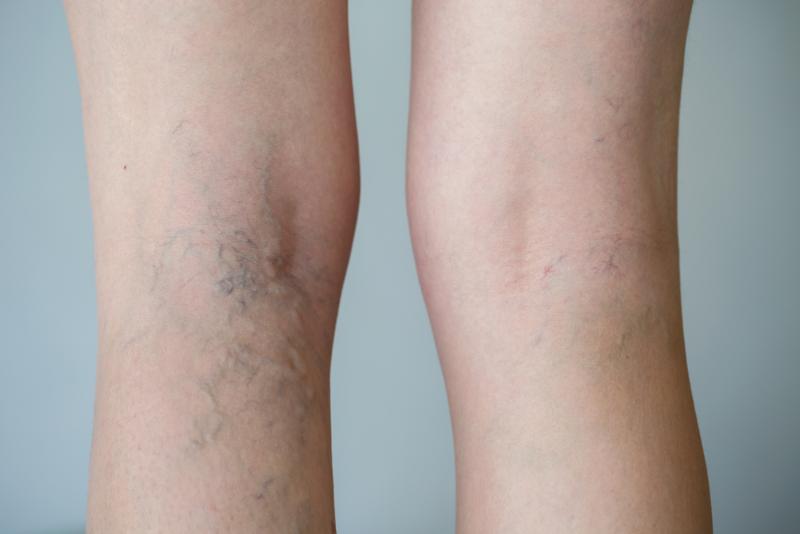With warmer weather and shorts season approaching, your attention may have turned to your legs. If they have visible spider or varicose veins, you may be tempted to keep them covered year-round. But there is no reason to hide them away! Cardiac Associates of North Jersey offers vein ablation as a safe and effective treatment option that can be performed right in our Oakland, New Jersey office.
Ablation refers to the destruction or removal of tissue. In relation to venous disorders, it uses heat generated by either radiofrequency waves or a laser to destroy the veins in question so the body can get rid of them. The heat is delivered through a catheter that is inserted in the affected vein. Vein ablation is considered safe and effective and has an excellent track record of safety and results. It is used to treat small spider veins and larger, more complex varicose veins.
Spider veins appear as small, web-like areas on the surface of your skin. They are most commonly found on the legs, although they can appear in other areas as well. Their tangled and intricate patterns often resemble a spider web, but it is actually the outline of small veins and capillaries just under your skin that have ruptured or become stagnant. Spider veins often appear red, purplish, or blue.
Varicose veins are a similar condition that occurs in larger veins. This makes them appear much bigger than spider veins. Many people describe them as looking and feeling like a rope or cord just under the skin. Varicose veins are caused when blood pools in your veins, usually due to a faulty valve. They can also be the result of thin vein walls that have become twisted and distorted due to increased pressure within them.
As its name implies, vein ablation destroys the affected veins. It does this by using the heat generated by a laser or radiofrequency waves to cauterize the affected section of the vein. Once the heat is applied, the tissue burns from within, gradually forming scar tissue and closing itself off.
What Will a Treatment Session Be Like?
During your vein ablation session, the doctor will locate and monitor the treatment area of your vein with an imaging device. This is usually done through sonography. This allows him to guide the catheter through your vein to the precise location of the damaged section.
Once the varicose vein is located, a catheter will be inserted into the vein through a small incision. A thin fiber will then be inserted through that catheter to the abnormal section of your vein. Once the probe is at the varicose or spider vein, your doctor will begin to apply heat as the fiber is slowly withdrawn. The intense heat from the laser or RF waves will cause your affected vein to die off but will not cause you pain or discomfort.
Your body will dissolve, absorb, and expel the dead tissue over time. Any blood that was flowing through it will naturally be diverted to other nearby veins. You may be able to treat smaller spider veins with a single session, but it can take several before they are removed completely. Be sure to discuss how many treatments you are likely going to need at your consultation appointment. Results usually take a couple of weeks to become noticeable.
That will depend largely on how you feel about your venous disorder and whether it is accompanied by any other symptoms. Many people choose to treat spider and varicose veins for purely cosmetic reasons. However, these vein issues are not always benign. Varicose veins can be an indication that you are susceptible to more serious venous disorders. That is one of the many reasons that seeking treatment with a cardiologist is a good idea.
Some people experience discomfort, including pain, burning, and itching around varicose veins. Because varicose veins can lead to chronic inflammation, they may also cause your legs to feel heavy and cumbersome. This may make you avoid physical activity, which can actually cause the condition to worsen because exercise helps improve circulation and reduce pooled blood.
Besides physical discomfort, there can be psychological consequences to having spider or varicose veins. They may make you feel self-conscious or anxious. For many people, they contribute to lower levels of self-confidence. You may seek to keep your legs covered even in warm weather, causing you to avoid activities you truly enjoy, like swimming or playing tennis.
Most adults with spider or varicose veins are good candidates for ablation treatments. However, there are some contraindications you should be aware of. Anyone who is pregnant, who has certain types of heart disease, or who has an infection at the treatment site should avoid ablation. Talk to your doctor about your complete medical history to be sure it is safe for you to undergo treatment.
If you are ready to learn more about how radiofrequency or laser vein ablation can help you, scheduling an initial consultation is the logical next step. At your appointment, you will have a chance to ask all of your questions and discuss whether ablation is a good choice for removing your spider and varicose veins. Contact the Oakland office of Cardiac Associates of North Jersey in Oakland, NJ to schedule your consultation today!


